Reliable SEO software suites help agencies plan campaigns, prove results, and demonstrate value to clients.
These technologies can provide technical insights, performance reports, and even assistance with content creation.
SaaS subscription costs can stack up and become difficult to manage, so it’s vital to ensure you’re using the best SEO software for your needs.
The following five options are some of the best on the market, each with its own strengths. This overview will help you evaluate the key features of each suite.
[Recommended Read] → A Guide to Essential SEO Tools for Agencies
What Is An SEO Software Suite?
The phrase “SEO software suite” covers a lot of bases.
There are so many potential components to an SEO strategy that covering them all – and covering them well – in one platform is a sizable task.
So, first of all, let’s draw some boundaries for our guide.
When we say “SEO software suite,” we mean technologies that perform at least a majority, if not all, of the following:
- Keyword opportunity research.
- Keyword rank tracking.
- Universal search analysis.
- Page reporting and recommendations.
- Content optimization recommendations.
- Competitor tracking and analysis.
- Backlink analysis.
- Site crawl functionality.
- Technical SEO crawling and recommendations.
- Core Web Vitals analysis.
- Social media metric tracking.
- Analytics integrations.
That is a broad spectrum of capabilities, but it is what modern marketers require of an SEO software suite.
As identified in the Search Engine Journal State Of SEO survey for 2022, SEO professionals split most of their time across technical, strategic, and content tasks.
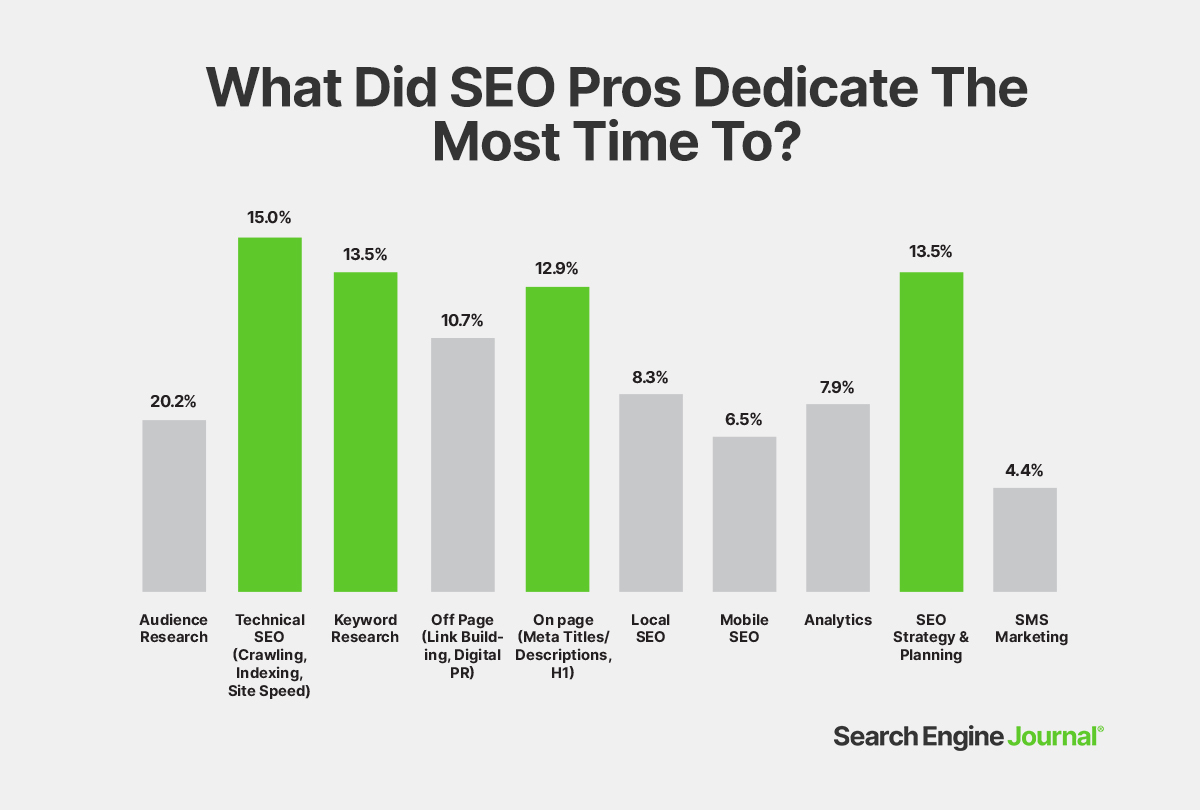
It is also worth stating that no SEO platform is the standout performer in every single one of these areas.
As a result, it is important to weigh up the factors that matter most to your marketing strategy before deciding on the right solution.
Where a platform perhaps falls short of being the industry leader, search marketers may also want to complement their SEO software suite with a specialized tool to compensate for this.
Ultimately, this guide will highlight the areas in which each platform excels to help you navigate this highly competitive landscape.
Botify
Botify‘s DNA is in technical SEO, which has won the platform a significant number of fans in the advanced SEO community.
Along with its proprietary crawling tools that use log file data to analyze search engine behavior, Botify also provides user-friendly dashboards that tie technical SEO fixes to business performance.
Historically, that has been the SEO equivalent of squaring the circle.
However, technical SEO remains fundamental to improved website performance.
A tool like Botify helps get those essential messages across.
The platform has developed into a full-service SEO software suite that goes beyond technical SEO to provide content recommendations and track social media metrics.
The core Botify Analytics product that uses the company’s proprietary crawler to report on site performance is now tied to Botify Keywords, a product that reveals the rankings impact of SEO and content issues.
Botify Intelligence uses machine learning to assess a company’s raw data and automate the prioritization of website fixes based on their potential performance impact.
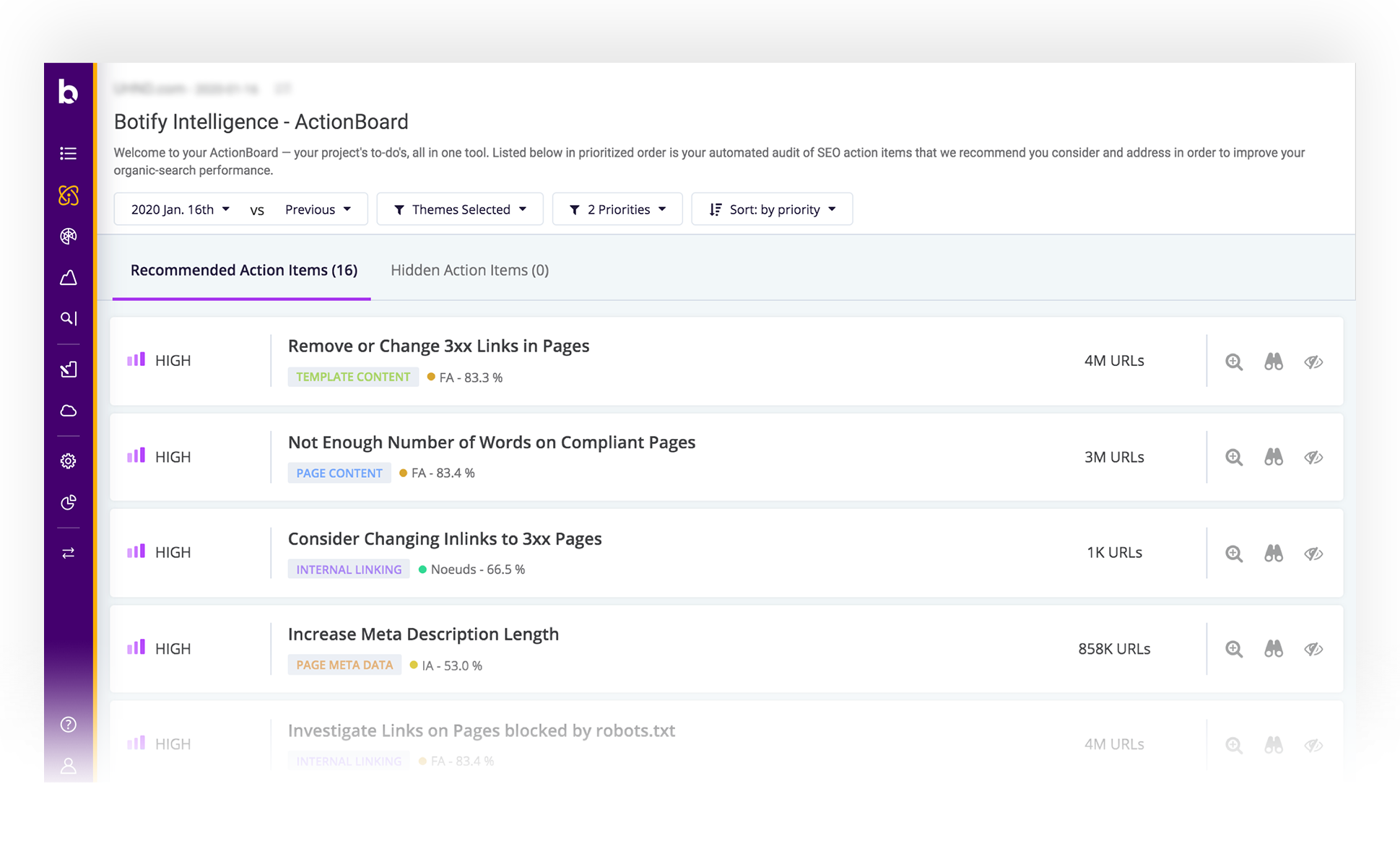 Screenshot from Botify, December 2022
Screenshot from Botify, December 2022As an SEO software suite, Botify has entered the market differently than the other platforms in this guide.
Where others have started as rank trackers that branched out into intent signals and content idea generation, Botify is a technical SEO software that is building organically on that platform over time.
All of these areas combine to create an advanced SEO strategy, but it is worth noting where Botify’s core strengths lie in comparison with the competition.
Unique Selling Points:
- Exceptional technical SEO analysis, including a crawl budget report and log file analyzer.
- Botify Keywords helps to tie technical SEO to performance improvements.
- Botify Intelligence automatically surfaces opportunities to increase website traffic.
- The frequency of crawls and availability of data are both at a very high level.
- The ability to segment website content and isolate issues is invaluable.
- Intuitive dashboards that communicate technical issues to non-technical audiences.
Ahrefs
Ahrefs is a popular, all-in-one set of SEO tools built on top of the Ahrefs Bot – a web crawler that maintains the platform’s index of 12 trillion links. That makes it the second most active web crawler (after GoogleBot), and the most active in the commercial SEO field.
This platform has grown rapidly over the last few years to include access to over 170 countries and 10 search engines.
The Keyword Explorer tool is the highlight when searching for new content ideas and keywords to target.
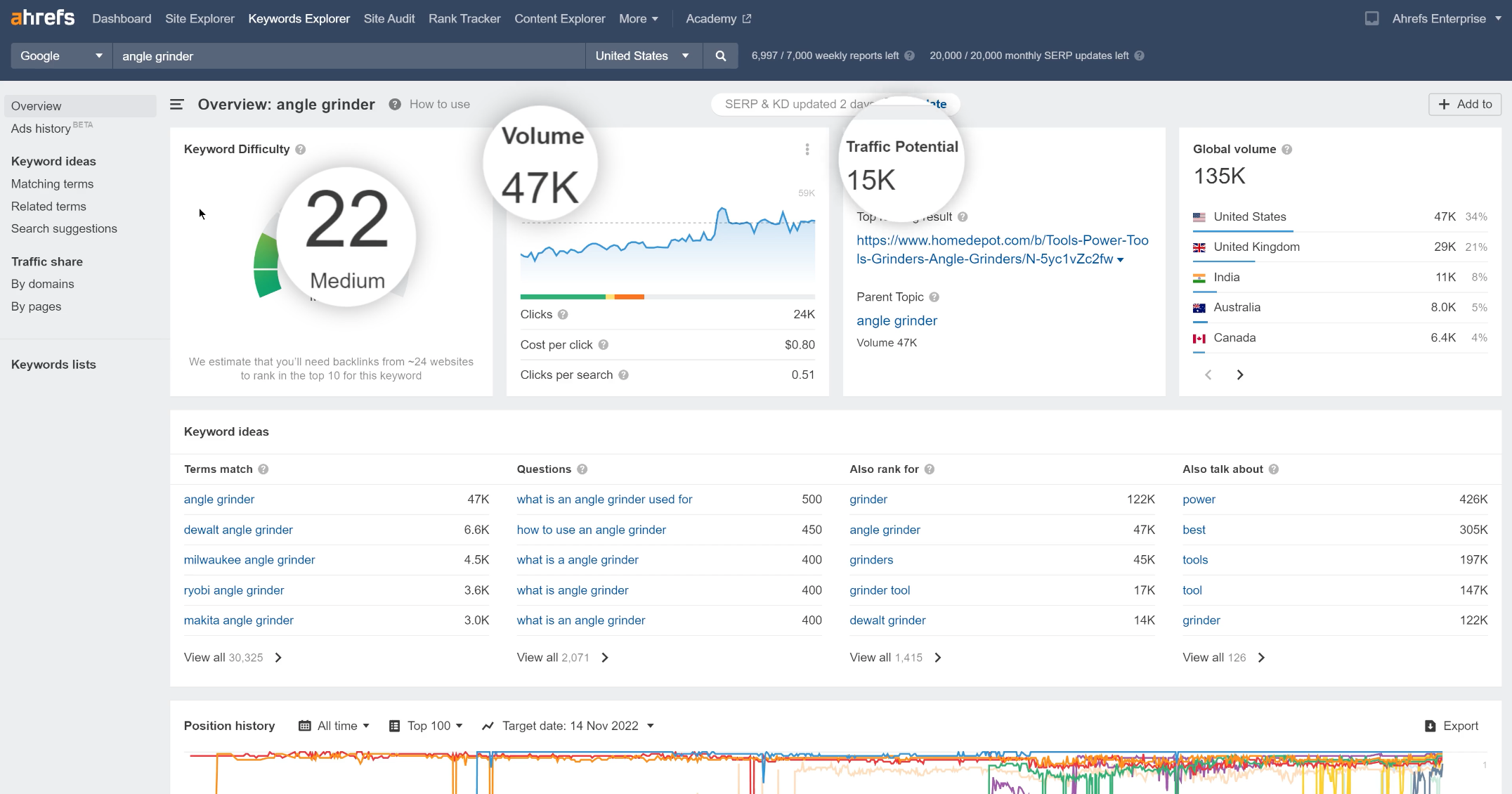 Screenshot from Ahrefs, December 2022
Screenshot from Ahrefs, December 2022The Content Explorer allows Ahrefs to diversify beyond its initial strengths in link tracking and keyword analysis.
This tool surfaces trending content from across the web, which can then be segmented to identify new topics that fit with your marketing objectives.
Overall, Ahrefs is an increasingly complete set of SEO tools. It is user-friendly for novices, yet it provides endless opportunities for SEO veterans to dig deeper into the data and create new tactics.
Unique Selling Points:
- An impressive web crawler and a vast link database.
- The Content Explorer brings social media and content marketing into the Ahrefs suite.
- Simple enough for novices, complex enough to satisfy advanced SEOs.
- Great coverage for international markets.
- Site Explorer is one of the best competitive analysis tools out there.
BrightEdge
BrightEdge has gone through many evolutions over the past decade. Most recently, it moved into AI-assisted content generation.
The core BrightEdge product is its rank tracking software, which updates weekly and produces automated reports that can be customized to each brand’s needs.
This is complemented by the StoryBuilder, which helps marketers to make sense of the masses of data available in such a platform.
Perhaps the real game-changer for BrightEdge in the last few years, though, has been the creation of Data Cube:
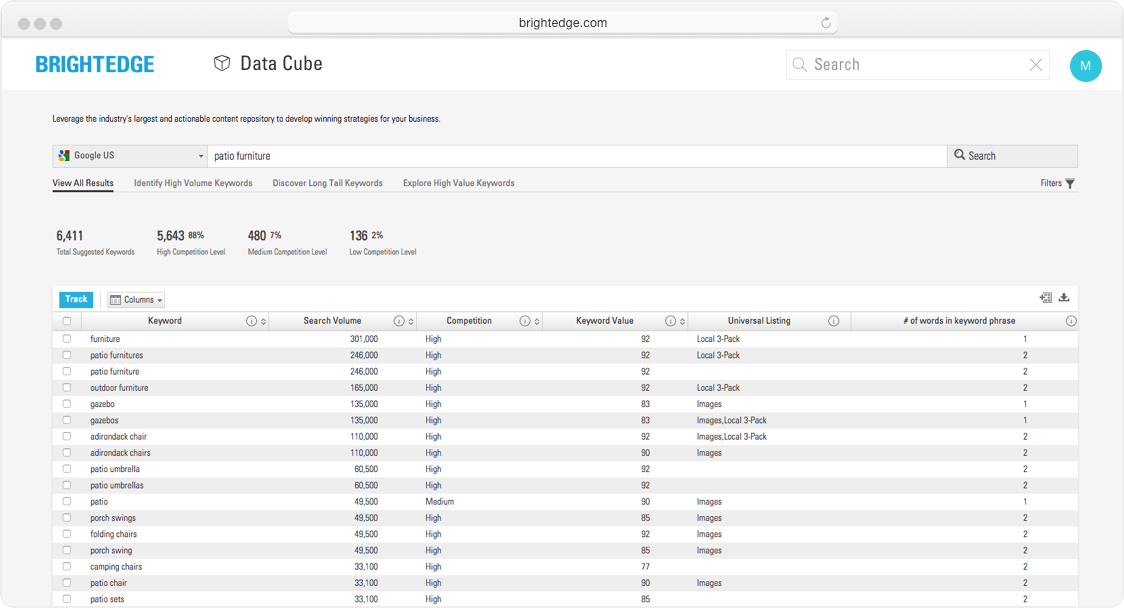 Image credit: BrightEdge.com, December 2022
Image credit: BrightEdge.com, December 2022Data Cube makes use of BrightEdge’s own index. It suggests new keyword ideas and also creates an overview of SEO visibility over time.
The latest AI-driven innovations in the platform include an Insights product, which automatically surfaces new site developments for marketers – and there is a new content platform that can optimize content as you create it.
BrightEdge is undoubtedly a leading contender for enterprise sites with integrations available for various analytics software packages.
It covers a significant number of the bases in our initial list of criteria – and plenty of new innovations are on the horizon.
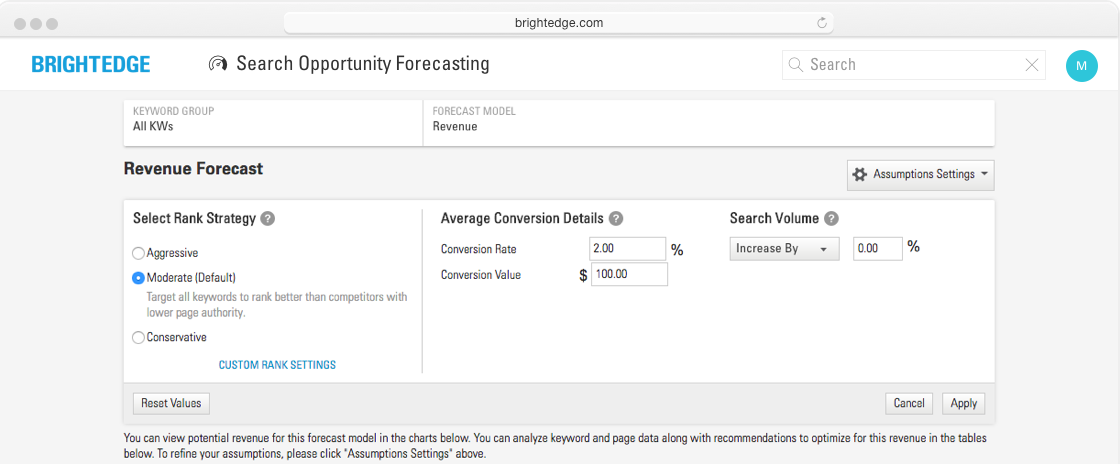 Image credit: BrightEdge.com, December 2022
Image credit: BrightEdge.com, December 2022One point to consider for the largest sites out there will be cost, as many BrightEdge packages are based on the number of keywords tracked.
As we move into a mobile-first, highly localized, personalized version of organic search, monthly fees for a BrightEdge license can grow quite quickly for marketers needing accurate tracking across devices and territories.
Tracking a query on desktop and on mobile will count as two keywords from your total allocation, for example.
Furthermore, it is worth corroborating some of the findings in BrightEdge with other tools.
The technical SEO recommendations are somewhat limited, and rankings pull weekly based on normalized values from a number of crawls over that period. In the case of the latter, you can end up with a ranking position that does not tell the full story.
Rankings can be pulled daily and at a local level, but again, this typically comes at an extra cost.
Those are not hesitations about the platform’s technological capabilities. However, they are worth considering for marketers looking for an all-in-one SEO platform.
BrightEdge does a lot of things – and does them well. But it is still a good idea to use specialist tools for technical SEO and backlink analysis.
Unique Selling Points:
- Intuitive, customizable dashboards with many API integrations available.
- Can track rankings in more than 76,000 locations.
- Data Cube is great for keyword and competitor research.
- Universal search rank tracking is very useful.
- Latest AI-driven developments could prove invaluable for time-poor digital marketers.
Conductor
Conductor is another enterprise-level software that has developed significantly beyond its initial offering as a rank-tracking platform.
In terms of its positioning in a crowded market, Conductor’s focus has shifted slightly more toward understanding audience intent and the importance of strategic insight for SEO performance.
Many of the dashboards within this platform are devised with the aim of helping you prioritize your workloads and emphasize the areas that will drive performance.
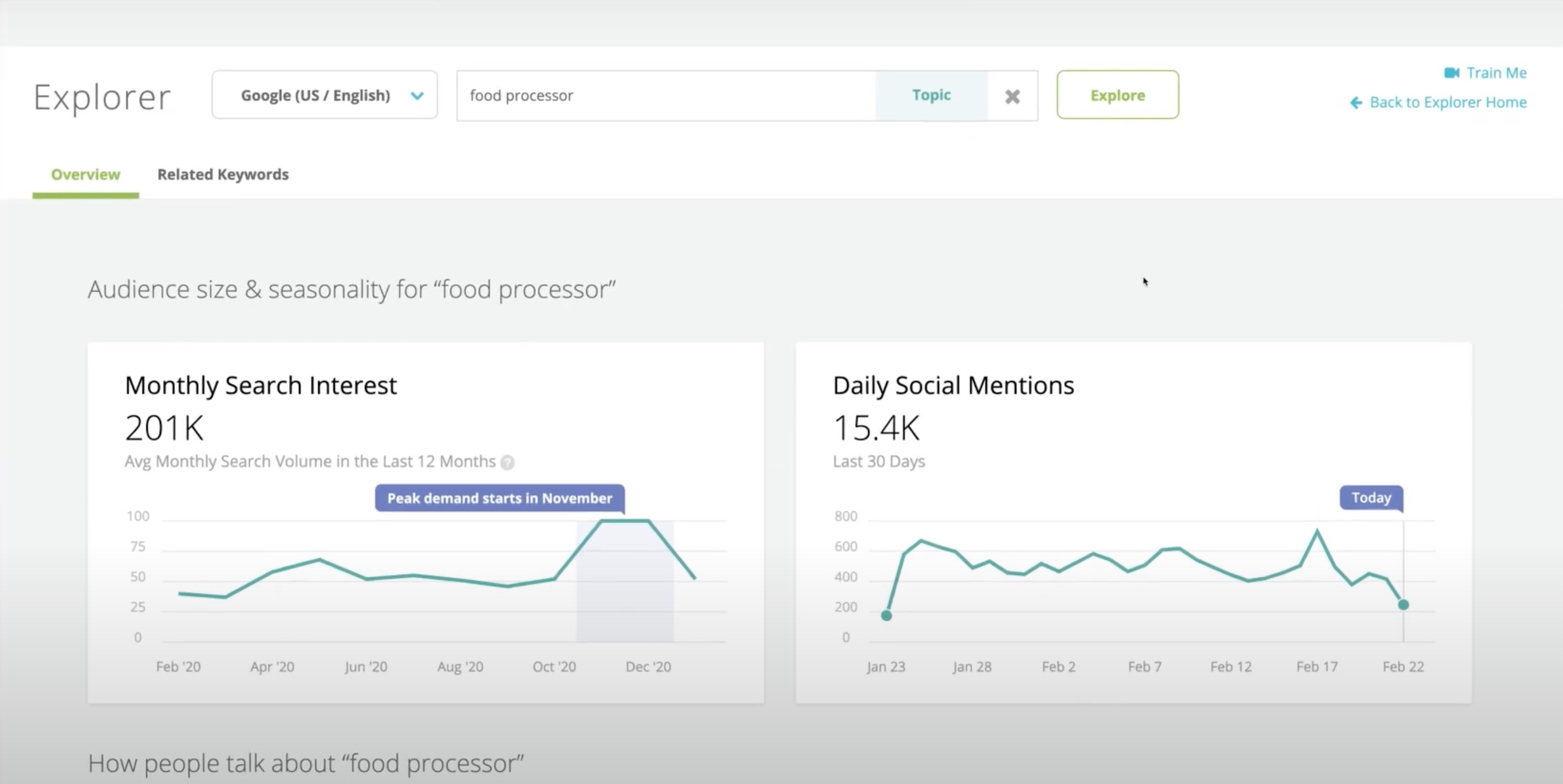 Screenshot from Conductor, January 2023
Screenshot from Conductor, January 2023I have always found that Conductor excels in its usefulness as an SEO platform. That may seem a trite observation, but it is the most fitting phrase.
When you are working on an SEO campaign, you can use Conductor to get things done.
Of course, it may just be that it tallies well with my particular way of working, but it has the feel of a technology built by SEO pros to help others overcome daily challenges.
For example, Conductor has tools that map content to a particular phase in the purchase journey, highlighting where a site performs well and where it performs poorly. This leads to actionable insights through a simple but effective visualization.
Conductor does not excel when it comes to technical SEO analysis. That said, it is possible to integrate the tool with DeepCrawl.
Furthermore, it is arguable that Conductor’s performance dashboards are not quite as visceral and effective as those of Searchmetrics and BrightEdge when it comes to driving home the top-line numbers.
Overall, Conductor offers a sophisticated package. It nurtures a healthy approach to organic search, beginning with a more nuanced understanding of consumer intent.
Unique Selling Points:
- Insightful audience and content planning tools.
- Dashboards help to visualize and simplify the SEO and content marketing workflow.
- The Business Case tool is handy when trying to demonstrate SEO potential to senior management.
- Lots of integrations with external analytics and SEO technologies.
- Support for over 100 international markets.
Moz Pro
Moz Pro is one of the most popular all-in-one SEO software suite contenders for small businesses.
Signing up for a license provides access to:
- A backlink checker (Open Site Explorer).
- A rank tracking tool (Rank Tracker).
- An on-page analyzer (On-Page Grader)
- And quite a few other helpful tools.
Moz Keyword Explorer is perhaps the highlight and is the newest addition to this particular software suite.
I particularly like this tool for keyword research as it fits in with the new landscape of obscured search volumes and topic-driven content generation.
While still sticking to the SEO fundamental of pinpointing search queries to target, Keyword Explorer goes further to suggest new topics and highlight their level of priority for the business in question.
These keywords can then move to the Moz Rank Tracker, allowing marketers to keep track of their progress.
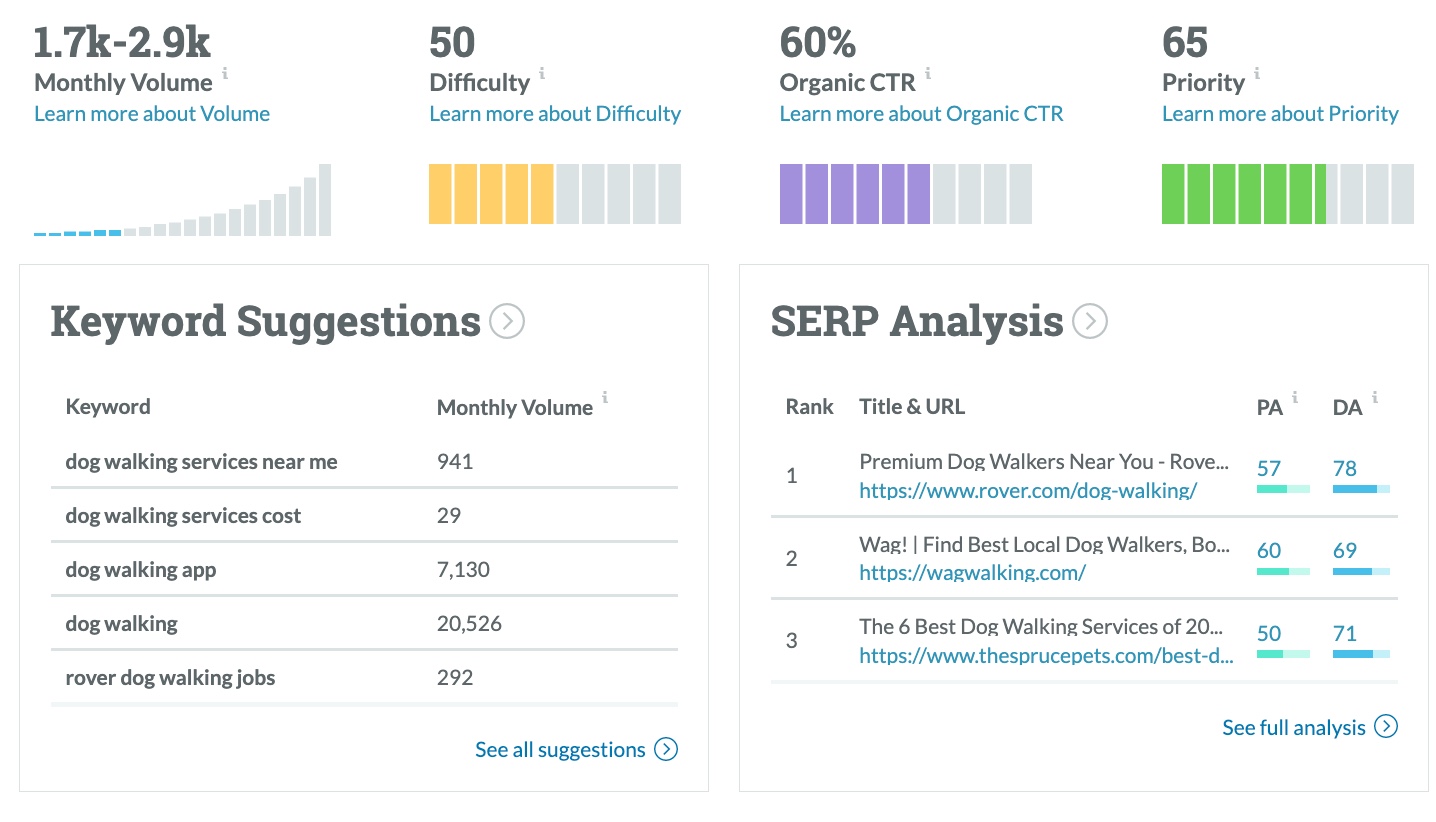 Screenshot from Moz Pro, January 2023
Screenshot from Moz Pro, January 2023Where is Moz a little weaker than the competition?
Given the significance of backlink analysis for SEO performance, it would be advisable to pair Moz with a tool like Ahrefs or Majestic.
None of these tools lay claim to a “full” index of URLs, and there is significant overlap between them, but the differences are significant enough to merit the use of more than one backlink checker.
Moreover, some of the tools (such as Moz Local) are best for sites with a smaller footprint, as a license will only provide access to a limited number of locations or keywords.
Nonetheless, a Moz Pro subscription starts at just $99 per month, making it a worthy addition to your SEO toolbox.
Unique Selling Points:
- Access to a range of SEO tools at a low cost.
- Moz Keyword Explorer is a fantastic tool for keyword research and SERP analysis.
- Open Site Explorer remains a useful competitor analysis tool.
- Moz’s proprietary metrics, such as Domain Authority, are illuminating for SEO strategies.
Summary
The SEO software suites in our guide have all invested heavily to keep pace with the demands of the industry.
Marketers require access to machine learning tools to help them surface new content and keyword opportunities in real time. The likes of Botify and BrightEdge have made this a priority for their recent and upcoming technology upgrades.
Marketers also require assurance that the basics are covered, and all these platforms do this very well. The SEO fundamentals of keyword tracking, technical audits, and content ideation are as important as ever.
SEO agencies will derive maximum value from these powerful tools by first identifying their own needs.
Although every strategy must cover the same areas, each accentuates some areas over others.
For instance, it may be that a huge retail website requires robust technical and keyword support over content recommendations. Those criteria will dictate which of these SEO software suites is, in fact, the best choice for you.
Featured Image: Paulo Bobita/Search Engine Journal





